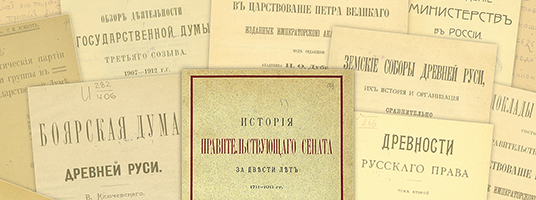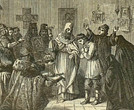Коллекции
- At the Origins of the Russian Statehood
In 2012 Russia is celebrating the 1150th anniversary of birth of the Russian statehood. The collection devoted to the event includes the materials disclosing both the issues of formation and development of the Old Russian state and the history of the holiday itself.
- Formation of a unified Russian state
Коллекция посвящена истории процесса собирания русских земель и формирования единого Русского государства в XV – первой половине XVI в. Она включает в себя монографии, авторефераты, труды известных историков В. Н. Татищева, Н. М. Карамзина, С. М. Соловьёва и других российских, советских и современных исследователей.
- Establishment and work of state institutions in Russia
The collection contains books which demonstrate the establishment, formation, development and work of state institutions in Russia. The significant contribution of Russian Emperors to the formation of the statehood, the influence of historical events on the work of institutions is fully reflected in the collection.
- Alexander Nevsky (1221–1263)
The collection is devoted to the 800th anniversary of the Prince of Novgorod, Grand Prince of Kiev, the saint of the Russian Orthodox Church Alexander Nevsky (1221–1263). It features studies, essays, biographies, hagiographies, speeches, archival and graphic materials.
- Ivan III Vasilievich (1440–1505)
The collection is dedicated to the life and reign of Ivan III, the remarkable ruler who united Russian lands under one state.
- Ivan IV (1530–1584)
The collection marks the study of the biography, activities and environment of the Grand Duke and first Tsar of the Moscow State, Ivan IV the Terrible (1533–1584). Archival documents such as letters, chronicles, scribe books, legislative acts, decisions of the church council, memorable speeches of the sovereign himself, his correspondence, writings of his contemporaries and even works of folklore of the 16th century are available. Historical works, thesis, collections of documents, video lectures, visual and cartographic materials are presented.
- Zemsky Sobors in the history of Russian statehood
The collection consists of such archival sources as official acts of all Moscow Zemsky Sobors of the 16th – 17th centuries, letters, petitions, as well as monographs, reviews, and other materials on the study of this issue in Russian and Soviet historical science.
- House of Romanov. The Zemsky Sobor of 1613
The collection includes about 900 items. These are official documents, memoirs, diaries, business and personal correspondence, newsreels, photos and paintings, audio records of radio programs, popular science films, historical studies, bibliography and more. Materials of the collection are brought together in thematic sections provided with brief summaries. Inside the section, the documents are grouped by biographical principle and arranged in chronological order - from birth to death of a person. In cases of a large number of documents, different headings are used, such as sources, studies and materials, childhood, coronation, travels, death, portraits and so on.
- Peter I (1672–1725)
The collection, timed to coincide with the 350th anniversary since the birth of Peter the Great, features scientific and popular publications of XVIII-XX centuries, dedicated to the personality of the innovator and his reforms; documentary prose of XVIII-XIX centuries, including the compositions of the first biographers of Peter I, collections of anecdotes and legends about him; publications of XVIII century, selected by Peter I to be printed in the Civil Script; collections of documents, decrees, letters of Peter I and selected issues of the most important legislative acts of the Peter’s era; maps, plans, drafts and drawings from the “Collection of Peter I” of the Library of the Russian Academy of Sciences, journals and other archival materials; images of the monuments dedicated to the Emperor, as well as historic sites and items, related to him.
- State Duma in the history of Russian statehood
The collection marks the 115th anniversary of the First Duma of the Russian Empire. It comprises the constituent documents, archival materials, political writings, research, verbatim records of meetings, reviews of activities and illustrative materials.











